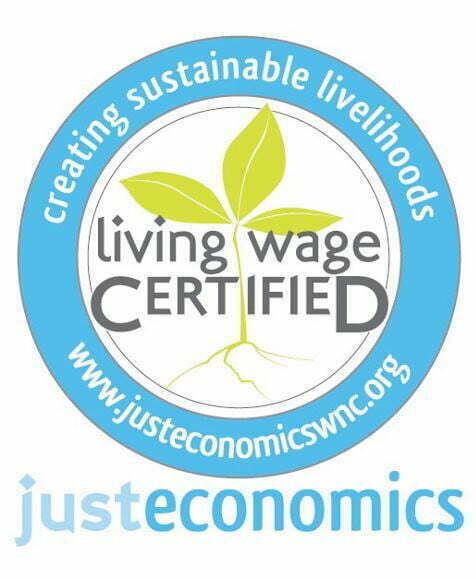As a community, how can we remove the systematic and systemic practices that perpetuate poverty and reduce food system equity? There is no single solution; however, a number of organizations in Buncombe, Haywood, Henderson, Madison, and Transylvania counties devote themselves to tackling the underlying causes of inequity and provide assistance to tens of thousands of individuals and families in need each year. Examples of a few include the following:
Addressing scarcity with the Society of St. Andrew (SoSA)
There are thousands of families in WNC that suffer from hunger and rely on social assistance programs to obtain food to feed themselves and their families. The Society of St. Andrew is a group that works with local farms and food banks to make sure that fresh produce is an available and accessible option for these families. This Christian hunger ministry operates a statewide, volunteer-driven gleaning network in both North and South Carolina. The Society of St. Andrew estimates that its North Carolina Gleaning Network salvages over five million pounds of fresh produce for the hungry each year from farms and farmers markets, and that more than 143 million pounds of fresh produce have reached people in need in North Carolina and South Carolina since they opened a North Carolina regional office in 1992.
Addressing wage inequity with Just Economics
According to the Massachusetts Institute of Technology’s Living Wage Calculator, the estimated living wage for residents of the five counties is, at a minimum, 22 percent higher than our state’s minimum wage of $7.25 per hour.

Individuals and families struggling to maintain financial security face increased challenges when it comes to obtaining a nutritious and diverse diet. Limited finances restrict where families are able to shop and what they can buy. Costs associated with transportation and time management further limit the accessibility of healthy food. This is why the Asheville-based group Just Economics launched its Living Wage Certification program, a campaign to promote employers who pay their workers a living wage. Over the past two years, Just Economics has certified over 300 local businesses and has provided outreach and education opportunities for low-wage workers, low-income persons, students, policy makers, and business owners on the importance of paying a living wage to support a just and sustainable economy. Their policy advocacy has resulted in Asheville City Council’s 2007 passage of a living wage ordinance for city workers, which was followed in 2012 by a similar ordinance for employees of Buncombe County.
Addressing equitable treatment with the Land Loss Prevention Project and Pisgah Legal Services
Historically, WNC has seen systematic discrimination against the poor and minorities when it comes to land rights and land access. Like so many other social injustices, poorer neighborhoods and neighborhoods dominated by ethnic minorities are disproportionately the target of environmental and land access injustices. Landfill sitings, hazardous waste dumping, land retention (including farmland), and the siting of industrial facilities all affect residents’ ability to live in a clean, safe environment, one that can produce healthy edible products and support local economic development.
Founded in 1982, the Land Loss Prevention Project was begun in North Carolina by the Association of Black Lawyers to curtail the epidemic loss of black-owned land in the state. Today, the organization advocates for limited resource, minority, and financially distressed farmers to help them develop sustainable agricultural practices and to help communities fight against environmental abuses. In hundreds of cases, the organization’s free legal assistance and public policy advocacy has helped to connect farmers to the resources they need to endure through crises and keep their land.
Since 1978, Pisgah Legal Services has worked in WNC to provide free civil legal aid to very low-income and vulnerable residents to help them meet their most urgent needs of housing, safety from abuse, health care, and income. Along with the Mountain Area Volunteer Lawyers (MAVL) Program, Pisgah Legal Services is able to coordinate a network of more than 300 volunteer lawyers to provide pro bono legal services to improve the systems and policies that impact the lives of thousands of low-income people in WNC, many of whom work in the low-wage food industry jobs of our region. This includes helping the area’s many foreign-born migrant workers comply with technical requirements to work legally and become citizens. For 2013 Pisgah Legal Services estimates that it secured more than $25,316,000 in quantifiable benefits for their clients, including home equity saved from foreclosure, child support for victims of domestic violence, Medicaid benefits payable to local medical providers, and subsistence income for disabled individuals.

